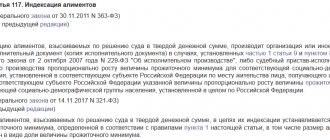The state fee is paid for the performance of legally significant actions, for which companies apply constantly and without fail, starting with the registration of their own activities. Individuals also quite often make such payments for certain services of government bodies. In some cases, specifically specified in regulations, organizations or individuals are faced with the need to return the paid amount of state duty in full or in part.
Question: By a court decision, the state duty was recovered from the losing party. Should the plaintiff - LLC (USN, “income”) include in income the amount of state duty received from the defendant? Is state duty returned from the budget included in income when the defendant is the tax authority? View answer
When and how can this be done? In what situations can a state duty refund not take place? What do taxpayers need to do to achieve this? How to correctly record these amounts in accounting? Let's figure it out together.
What state fees do legal entities and individuals pay?
The budget receives certain amounts through the appeal of organizations and individuals to government agencies for carrying out actions with legal consequences.
Question: Is it possible to return the state fee in case of refusal to register a lease agreement? How is this duty reflected in tax accounting depending on the result of registration of the agreement? View answer
Basic fees for organizations
Organizations constantly contribute certain funds to the budget as state duties. The amounts and timing of these deductions vary and depend on the type of activity of the company and the nuances of its functioning. Conventionally, duties paid by legal entities can be divided into 3 groups:
- Organizational expenses:
- registration of activities;
- amendments to the Charter;
- issuance of licenses;
- applying for permits;
- registration of certificates;
- ordering an urgent extract from the Unified State Register of Legal Entities;
- certification of contracts, etc.
- Registration of acquired assets and/or rights.
- Interaction with courts.
In what order and amount is the state fee returned to the plaintiff if the claim is abandoned in the arbitration process ?
What fees can an individual pay?
Throughout their lives, Russian citizens often turn to government agencies when they require any legal action. For this, according to the Tax Code of the Russian Federation, they must pay a state duty. The most common requests are:
- to courts of various levels;
- to the police;
- to notaries;
- to the registry office;
- registration of services for obtaining Russian citizenship or renunciation of it;
- documentary support for entry and exit from the country, etc.
In what cases is it possible to refund (offset) the state duty ?
How to return the state fee?
The refund of the duty is processed by sending to the Federal Tax Service an application for the refund of the state duty in the form approved in Appendix 8 to the order of the Federal Tax Service of the Russian Federation dated February 14, 2017 No. ММВ-7-8/ [email protected] From January 9, 2019, this form is used as amended by the Federal Tax Service order dated November 30 .2018 No. ММВ-7-8/ [email protected]
The taxpayer must submit an application for refund of the state duty to the Federal Tax Service within 3 years from the date of payment of the duty to the budget.
ConsultantPlus experts explained whether the state duty is refunded if the claim is abandoned. Get trial access to the K+ system and upgrade to the Ready Solution for free.
Let's study the features of filling out this application.
Fees that are allowed to be refunded
Tax Code of the Russian Federation in paragraph 1 of Art. 333.40 of the Tax Code of the Russian Federation regulates situations when citizens or organizations can be refunded (in whole or in part) the state duty they previously transferred. This can be done not with any payment, but only if:
- the company or individual transferred the amount of state duty higher than necessary;
- the document for which the state fee was paid was not accepted or was returned;
- the court left the claim, for the filing of which a fee was transferred, without consideration;
- the legal proceedings were terminated;
- the notary refused to perform actions paid for by the state fee;
- the required document (passport, identity card, etc.) was refused;
- the person who paid the state duty renounces the intention to commit actions with legal consequences.
Is a court ruling on the return of state fees ?
NOTE! The last reason will be relevant only if, having paid the state fee, the citizen or company has not yet contacted the authorized bodies. That is, if there was an appeal, and then the application was withdrawn, it will no longer be possible to return the amount of the fee.
Erroneous state duties
You can also return a state fee transferred by mistake, that is, that went to the wrong bank account due to inaccuracies in payment details. This happens due to errors by the cashier or the payer himself. A common reason is the use of irrelevant (outdated) details.
Naturally, the state duty transferred for services for which it is not provided for by the Tax Code of the Russian Federation will be refunded.
Results
The state duty paid to the budget on the grounds prescribed in Art. 333.40 of the Tax Code of the Russian Federation, the taxpayer has the right to return from the budget. To do this, he needs to send to the Federal Tax Service an application drawn up in the prescribed form for the return of the state duty within 3 years from the date of payment of the duty.
You can find other useful information about state duties in the following materials:
- “Which BCC should I pay the state fee for registering a company or individual entrepreneur?”;
- “Payment order for payment of state duty - sample 2019-2020”.
You can find more complete information on the topic in ConsultantPlus. Free trial access to the system for 2 days.
When the state duty cannot be returned
The law stipulates several special exception cases, in the event of which it is unlawful to ask for a refund of the state duty:
- The fee was transferred for registering a marriage, but the wedding did not take place for some reason. The same applies when filing a divorce.
- An application was submitted to change the first or last name, for which a state fee was paid, but the applicant changed his mind and did not do this.
- After filing a claim in court, the defendant at some stage before the end of the process agreed to fulfill the claims.
- The state fee was paid, but government agencies refused to register the applicant:
- driver's license;
- legal entity;
- restrictions on real estate rights (encumbrances);
- real estate transactions.
In all these cases, the state duty will not be returned to the payer, either fully or partially.
IMPORTANT! The only exception is the registration of termination of registration of real estate transactions and the imposition of encumbrances on it. If the parties confirm their will with appropriate statements, they will be able to return 50% of the state duty.
How to proceed to return the transferred state duty
The algorithm of actions of a legal entity or individual to return the amount of state duty includes a number of actions stipulated by the legislation of the Russian Federation:
- Collection of necessary documentation:
- to return the entire amount of the duty - originals of checks, receipts, bills or other documents confirming payment;
- to return part of the fee - copies of these documents.
- Writing an application. There is no strict form for it, but some organizations recommend their own forms, which can be obtained directly from their institutions or taken from their websites on the Internet. If the application is drawn up at your own discretion, it must include:
- data of the state duty payer;
- purpose of payment;
- reasons for return;
- account details for transferring state duty back.
- Submitting an application. You need to hand it over to the boss of the tax office that accepted payment of the state duty. For personal delivery, a receipt will be required. You can send the document by mail with notification. Online submission is not permitted.
- Waiting times. The official body makes a decision on return or non-return within ten days. And the money will be credited to the account specified by the payer within 1 month - the payment is made by the Federal Treasury.
ATTENTION! If you need to return the fee for ship applications, you will need a court decision or certificate giving the go-ahead for the return of all or part of the state fee.
Tax Code of the Russian Federation, Article 333.40 of the Tax Code of the Russian Federation
1. The paid state fee is subject to partial or full refund in the following cases:
- 1) payment of state duty in a larger amount than provided for in this chapter;
- 2) return of an application, complaint or other appeal or refusal to accept them by the courts or refusal to perform notarial acts by authorized bodies and (or) officials. If the state duty is not returned, its amount is counted towards the payment of the state duty when a claim or administrative claim is filed again, unless the three-year period has expired from the date of the previous decision and the original document on payment of the state duty is attached to the repeated claim or administrative claim;
- 3) termination of proceedings in the case (administrative case) or leaving the application (administrative claim) without consideration by the Supreme Court of the Russian Federation, courts of general jurisdiction or arbitration courts.
When concluding a settlement agreement before a decision is made by the Supreme Court of the Russian Federation or arbitration courts, 50 percent of the amount of the state duty paid by him shall be returned to the plaintiff. This provision does not apply if the settlement agreement is concluded during the execution of a judicial act.
The paid state fee is not subject to refund if the defendant (administrative defendant) voluntarily satisfies the demands of the plaintiff (administrative plaintiff) after the said plaintiffs appeal to the Supreme Court of the Russian Federation, an arbitration court and a ruling is made on accepting the statement of claim (administrative statement of claim) for proceedings, as well as when approval of a settlement agreement, reconciliation agreement by the Supreme Court of the Russian Federation, a court of general jurisdiction;
4) refusal of persons who have paid the state duty to perform a legally significant action before contacting the authorized body (official) performing this legally significant action;
5) refusal to issue a passport of a citizen of the Russian Federation for leaving the Russian Federation and entering the Russian Federation, certifying in cases provided for by law, the identity of a citizen of the Russian Federation outside the territory of the Russian Federation and on the territory of the Russian Federation, a refugee travel document;
6) sending the applicant a notice of acceptance of his application to withdraw the application for state registration of a computer program, database and topology of an integrated circuit before the date of registration (in relation to the state fee provided for in paragraph 1 of Article 330.30 of this Code).
2. The state fee paid for the state registration of marriage, divorce, name change, corrections and (or) changes in the civil status record is not refundable, if the state registration of the corresponding civil status act was not subsequently carried out or corrections and changes were made to civil registration records.
3. An application for the return of an overpaid (collected) amount of state duty is submitted by the payer of the state duty to the body (official) authorized to perform legally significant actions for which the state duty was paid (collected).
The application for the return of an overpaid (collected) amount of state duty shall be accompanied by original payment documents if the state duty is subject to full refund, and if it is subject to partial refund, copies of the specified payment documents.
The decision to return to the payer the overpaid (collected) amount of state duty is made by the body (official) carrying out the actions for which the state duty was paid (collected).
The refund of the overpaid (collected) amount of state duty is carried out by the Federal Treasury.
An application for the return of an overpaid (collected) amount of state duty in cases heard in courts, as well as by magistrates, is submitted by the payer of the state duty to the tax authority at the location of the court in which the case was heard.
Decisions, rulings or certificates from courts about the circumstances that are the basis for a full or partial refund of the overpaid (collected) amount of state duty, as well as original payment documents if the state duty is subject to refund in full, and if it is subject to partial refund - copies specified payment documents.
An application for the return of an overpaid (collected) amount of state duty may be submitted within three years from the date of payment of the specified amount.
Refund of the overpaid (collected) amount of state duty is made within one month from the date of filing the specified application for refund.
4. The state fee paid for state registration of rights, restrictions (encumbrances) of rights to real estate, transactions with it is not refundable in the event of refusal of state registration.
Upon termination of the state registration of a right, restriction (encumbrance) of a right to real estate, a transaction with it, on the basis of relevant statements of the parties to the agreement, half of the paid state duty is returned.
5. Lost force on January 1, 2007. — Federal Law of July 27, 2006 N 137-FZ.
6. The payer of the state duty has the right to offset the overpaid (collected) amount of the state duty against the amount of the state duty payable for performing a similar action.
This offset is made upon the payer’s application submitted to the authorized body (official) to which he applied to perform a legally significant action. An application for offset of the amount of overpaid (collected) state duty may be filed within three years from the date of the relevant court decision on the return of the state duty from the budget or from the date of payment of this amount to the budget. The application for offset of the amount of overpaid (collected) state duty shall be accompanied by: decisions, rulings and certificates of courts, bodies and (or) officials carrying out actions for which the state duty is paid, on the circumstances that are the basis for a full refund of the state duty, and also payment orders or receipts with a genuine bank mark confirming payment of the state duty.
7. Refund or offset of overpaid (collected) amounts of state duty is carried out in the manner established by Chapter 12 of this Code.
8. The state duty paid for the testing, analysis and branding of jewelry and other products made of precious metals is not refundable if such products are returned in an unbranded form on the grounds provided for by the legislation of the Russian Federation.
Refund of state duty in accounting entries
To account for state duties, the PBU provides for a special account 68 “Calculations for taxes and fees”, a subaccount “Calculations for state duties”. Since the money returned as state duty is income for the organization, it must be taken into account in subaccount 91 “Other expenses”. The postings will look like this:
- debit 68, credit 51 “Current accounts” - payment of funds on account of state duties;
- debit 68, subaccount “Calculations for state duty”, credit 91, subaccount “Other income” - state duty subject to refund is included in other income;
- debit 51, credit 68 – the state duty has been returned in full (or part of the state duty has been received back).
FOR YOUR INFORMATION! If the costs of paying the state duty have already been written off, and the funds were returned, these entries must be reversed.




